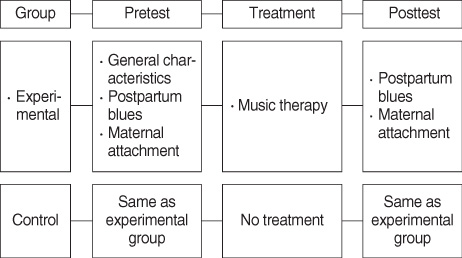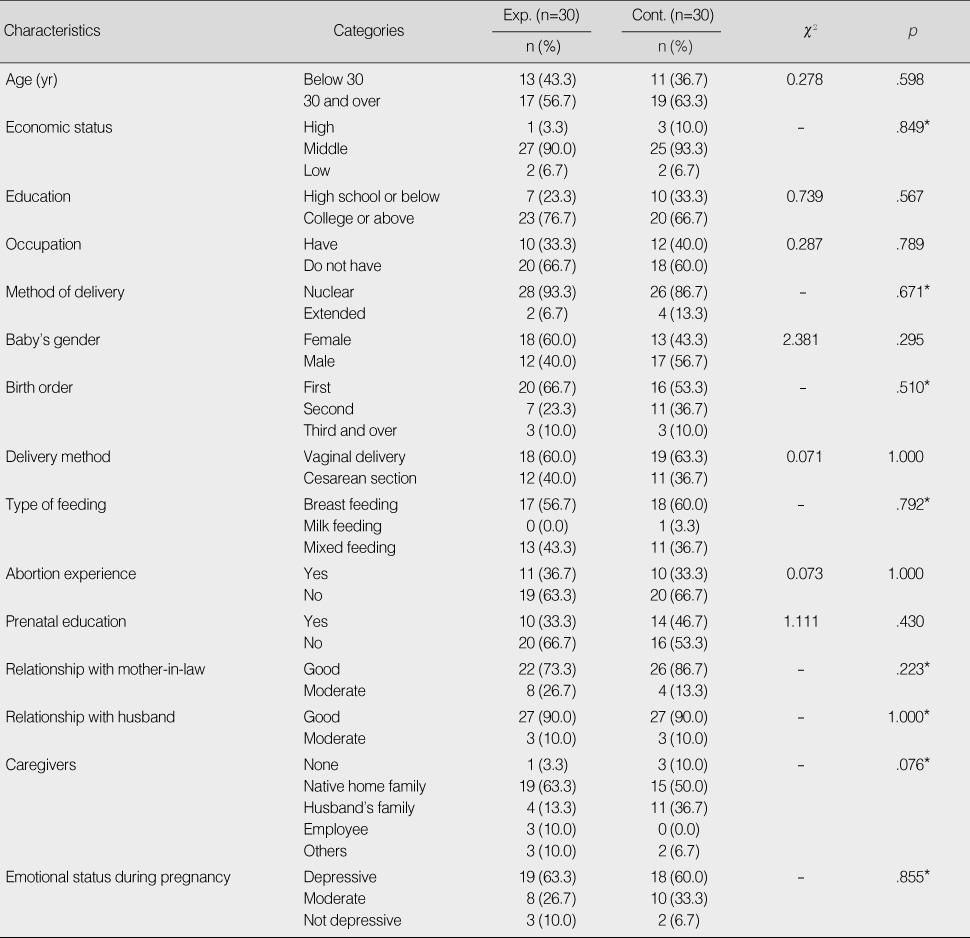Articles
- Page Path
- HOME > J Korean Acad Nurs > Volume 40(1); 2010 > Article
-
Original Article
- The Effects of Music Therapy on Postpartum Blues and Maternal Attachment of Puerperal Women
- Sun Mi Lee
-
Journal of Korean Academy of Nursing 2010;40(1):60-68.
DOI: https://doi.org/10.4040/jkan.2010.40.1.60
Published online: February 28, 2010
Doctoral Student, Department of Nursing, Catholic University of Daegu, Daegu, Korea.
- Address reprint requests to: Lee, Sun Mi. 206-206 Boseong apartment, 277 Weolseong-dong, Dalseo-gu, Daegu 704-400, Korea. Tel: 82-53-634-1759, Fax: 82-53-621-4106, selva88@hanmail.net
Copyright © 2010 Korean Society of Nursing Science
Abstract
-
Purpose
- The purpose of this study was to determine the effects of music therapy on postpartum blues and maternal attachment of puerperal women.
-
Methods
- The research design was a nonequivalent control group non-synchronized design. The participants were puerperal women who agreed to participate in this study and through a convenience sampling, 60 puerperal women were recruited (30 in the experimental group, 30 in the control group). After measuring postpartum blues and maternal attachment, music therapy was provided to the experimental group over 40 min, once a day, and for 8 days. Then, postpartum blues and maternal attachment for the experimental and control group were measured again on the 8th day. The data were analyzed using the SPSS WIN 12.0 Program.
-
Results
- The first hypothesis that "the degree of postpartum blues for the experimental group who participated in music therapy would be lower than that of the control group" was accepted (t=4.350, p<.001). The second hypothesis that "the degree of maternal attachment of the experimental group who participated in music therapy would be higher than that of the control group" was accepted (t=4.828, p<.001).
-
Conclusion
- These findings indicate that music therapy has positive influences on decreasing postpartum blues and increasing maternal attachment of puerperal women.
This article is based on a part of the first author's master's thesis from Daegu Catholic University.
- 1. Ainsworth MD. Attachments beyond infancy. The American Psychologist. 1989;44:709–716.ArticlePubMed
- 2. Alvin J. Music Therapy. 1975;New York, NY, Basic Books, Inc.
- 3. Bai JI. A study on the development of a postpartum depression scale. Journal of Korean Academy of Nursing. 1997;27:588–600.
- 4. Bai JI. Development of a home-based multimedia tutoring system for postpartum depression management. Journal of Korean Academy of Nursing. 1999;29:9–20.ArticlePDF
- 5. Beck CT. A meta-analysis of predictors of postpartum depression. Nursing Research. 1996;45:297–303.ArticlePubMed
- 6. Cho BH, Yang MS. Relationship between postpartum depression and parenting stress of mother with infant. The Research Institutes for Human Life. 2001;5:79–87.
- 7. Cho YS. The effects of the husband's emotional support on the prevention of postpartum depression: Using an experimental teaching intervention. 1987;Seoul, Ewha Womans University. Unpublished master's thesis.
- 8. Choi EJ. A study on effects of music therapy for mental depression of middle-aged women: Middle-aged Women Residing in the United States. 2003;Gwangju, Chonnam National University. Unpublished master's thesis.
- 9. Choi J. The effect of music therapy on depression and anxiety in patients undergoing hemodialysis. 1996;Seoul, Korea University. Unpublished master's thesis.
- 10. Cummings E, Davies PT. Maternal depression and child development. Journal of Child Psychology and Psychiatry and Allied Disciplines. 1994;35:73–112.ArticlePubMed
- 11. Jeon MA. The effects of postpartum exercise program on the body composition and depression of maternities. 2002;Gwangju, Chonnam National University. Unpublished master's thesis.
- 12. Jeong SB. A study on the development of health-enhancing practice programs using comprehensive musical activities with special reference to elderly welfare facilities. 2006;Daejeon, Daejeon University. Unpublished doctoral dissertation.
- 13. Jin ST. Music Therapy (II)-The psychological and physical effect of music. New Medical Journal. 1983;26:101–106.
- 14. Kendell R. Emotional and physical factors in the genesis of puerperal mental disorders. Journal of Psychosomatic Research. 1984;29:3–11.Article
- 15. Kim HJ. Effects of aroma therapy on postpartum depression. 2003;Changwon, Changwon University. Unpublished master's thesis.
- 16. Kim JA. Effects of music therapy on pain and depression of musculoskeletal trauma patient. 1994;Daegu, Kyungpook National University. Unpublished doctoral dissertation.
- 17. Kim KB, Kim IS, Jeong MY, Oh HK, Kwon YS, Lee EJ, et al. The effect of the musical therapy on depression and quality of life in the institutional elderly. Journal of the Korean Gerontological Society. 1999;1:217–223.
- 18. Kim KB, Lee MH, Sok SH. The effect of music therapy on anxiety and depression in patients undergoing hemodialysis. Journal of Korean Academy of Nursing. 2006;36:321–329.ArticlePubMedPDF
- 19. Kim KY. Effects on maternal-infant attachment by the Taegyo perspective prenatal class. 2000;Seoul, Yonsei University. Unpublished master's thesis.
- 20. Klaus MH, Kennell JH. Maternal-Infant Bonding. 1980;St. Louis, MO, C. V. Mosby.
- 21. Kwon IS. Effects on music therapy on pain, discomfort and depression for patients with fractured leg. 2003;Daegu, Keimyung University. Unpublished master's thesis.
- 22. Kwon JH. A test of a vulnerability-stress model of postpartum depression. Korean Journal of Clinical Psychology. 1997;16:55–66.
- 23. Lee JK. Psychiatry. 2000;Seoul, Ilchokak.
- 24. McClosky JC, Bulechek GM. McClosky JC, Bulechek GM. Music Therapy. In: Nursing Interventions Classification (NIC). 1992;St. Louis, MO, Mosby Year Book Inc. 346.
- 25. McGrath MM, Meyer EC. Maternal self-esteem: From theory to clinical practice in a special care nursery. Child Health Care. 1992;21:199–205.ArticlePubMed
- 26. Nagata M, Nagagi Y, Sobajima H, Ando T, Nishide Y, Honjo S. Maternity blue and attachment to children in mothers of full-term normal infant. Acta psychiatrica Scandinavica. 2000;101:209–217.PubMed
- 27. Nonacs R. Postpartum depression overview. 2005;March 5 March 5, 2005. from http://www.emedicinehealth.com/postpartum_depression/article_em.htm.
- 28. Park YS, Kim KS. The effects of systematic group music therapy for the inpatients with depressive mood and psychiatric behavior. Seoul Journal of Nursing. 1996;10:53–69.
- 29. Shin HJ. The effects of Kangaroo' care on the maternal attachment and postpartum depression as well as on the growth of preterm infants. 2007;Daejeon, Eulji University. Unpublished master's thesis.
- 30. Sung MH, Kim MK. A study of the effects of behavior contact in early mother-infant attachment. Journal of Korean Academy of Nursing. 2005;35:842–849.ArticlePubMedPDF
REFERENCES
Figure & Data
REFERENCES
Citations

- Music interventions to improve women’s health outcomes in the preconception, antepartum, intrapartum, and postpartum periods: An overview of reviews
Meighan Mary, Briana Kramer, Kirantheja Daggula, Anqi He, Sarah Clifford, Elizabeth Stierman, Kathryn Spielman, Porcia Manandhar, Andreea A. Creanga, Kshitij Karki
PLOS One.2026; 21(2): e0339337. CrossRef - The Effects of Laughter Therapy, Music Listening and Diary Keeping Given to Pregnant Women on Mental Health and Maternal Attachment Levels in Postpartum Period
Sibel Kıyak, Deniz Koçoğlu-tanyer
Sağlık Bilimlerinde Değer.2024; 14(3): 425. CrossRef - Creative art therapy for postpartum depression: A systematic review and meta-analysis
Jingyu Xu, Baojuan Wang, Wenbin Zhu, Haiqing Ao
Complementary Therapies in Clinical Practice.2024; 57: 101886. CrossRef - The effect of music played to new birth mothers on postpartum blues: A randomized controlled trial
Burcu KÜÇÜKKAYA, Işıl CAN, Gamze GÜLER
Early Human Development.2024; 192: 106013. CrossRef - Maternity Blues: A Narrative Review
Valentina Tosto, Margherita Ceccobelli, Emanuela Lucarini, Alfonso Tortorella, Sandro Gerli, Fabio Parazzini, Alessandro Favilli
Journal of Personalized Medicine.2023; 13(1): 154. CrossRef - The effects of music therapy on labor pain, childbirth experience, and self-esteem during epidural labor analgesia in primiparas: a non-randomized experimental study
Seong Yeon An, Eun Ji Park, Yu Ri Moon, Bo Young Lee, Eunbyul Lee, Dong Yeon Kim, Seong Hee Jeong, Jin Kyung Kim
Korean Journal of Women Health Nursing.2023; 29(2): 137. CrossRef - The effect of music therapy on labor pain: Systematic review and meta-analysis
Razhan Chehreh, Hamed Tavan, Zoleykha Karamelahi
Douleurs : Évaluation - Diagnostic - Traitement.2023; 24(3): 110. CrossRef - The effects of music therapy applied to pregnant women on maternal, fetal, and neonatal results: A randomized controlled study
Şeyma Çatalgöl, Esin Ceber Turfan
Health Care for Women International.2022; 43(5): 448. CrossRef - The Effectiveness of Group Hope Therapy in Labor Pain and Mental Health of Pregnant Women
S. Abdolvahab Samavi, Samaneh Najarpourian, Moosa Javdan
Psychological Reports.2019; 122(6): 2063. CrossRef - The effectiveness of music therapy for postpartum depression: A systematic review and meta-analysis
Wen-jiao Yang, Yong-mei Bai, Lan Qin, Xin-lan Xu, Kai-fang Bao, Jun-ling Xiao, Guo-wu Ding
Complementary Therapies in Clinical Practice.2019; 37: 93. CrossRef - Efficacy of a footbath for post‐partum fatigue in South Korea: A quasi‐experimental study
Eunsun Choi, Eunju Song
Japan Journal of Nursing Science.2017; 14(2): 126. CrossRef - Patterns and Factors associated with Complementary and Alternative Medicine Use among Korean Postpartum Women
Ju Hee Kim, Hye Sook Shin, So Young Kim, Hye Kyung Lee, So Hee Lim
Korean Journal of Women Health Nursing.2016; 22(1): 1. CrossRef - Effects of Music Therapy and Phone Counseling on Postpartum Depression and Maternal Identity in High Risk Women
Hae Won Kim, Sun OK Kim, Hye Gyung Kim, Hyang Ran Jeon
Perspectives in Nursing Science.2014; 11(1): 63. CrossRef - Effect of music therapy during vaginal delivery on postpartum pain relief and mental health
Serap Simavli, Ikbal Kaygusuz, Ilknur Gumus, Betul Usluogulları, Melahat Yildirim, Hasan Kafali
Journal of Affective Disorders.2014; 156: 194. CrossRef - Integrative Review of Nursing Intervention Studies on Mother-Infant Interactions.
Sun Jung Park, Shin Jeong Kim, Kyung Ah Kang
Child Health Nursing Research.2014; 20(2): 75. CrossRef - Music Therapy on Anxiety, Stress and Maternal-fetal Attachment in Pregnant Women During Transvaginal Ultrasound
Hye Sook Shin, Ju Hee Kim
Asian Nursing Research.2011; 5(1): 19. CrossRef - Effect of Jang-Gu Program and Self-help Management Program on Depression, Stress, Pain and Body Discomfort in Women with Osteoarthritis
Yeong-Hee Jeong, Jong-Im Kim, Sun-Ae Kim, Keum-Ok Lim
Journal of muscle and joint health.2010; 17(2): 212. CrossRef - RECENT LITERATURE
Focus on Alternative and Complementary Therapies.2010; 15(3): 264. CrossRef

Figure 1
Homogeneity Test of General Characteristics and Obstetric Characteristics Between Experimental and Control Groups (N=60)
*Fisher's exact test.
Exp.=Experimental group; Cont.=Control group.
Homogeneity Test of Dependent Variables Before Treatment Between Experimental and Control Groups (N=60)
Exp.=Experimental group; Cont.=Control group.
Difference of Postpartum Blues and Maternal Attachment Between Experimental and Control Groups (N=60)
Exp.=Experimental group; Cont.=Control group.
*Fisher's exact test. Exp.=Experimental group; Cont.=Control group.
Exp.=Experimental group; Cont.=Control group.
Exp.=Experimental group; Cont.=Control group.
 KSNS
KSNS
 E-SUBMISSION
E-SUBMISSION




 Cite
Cite

